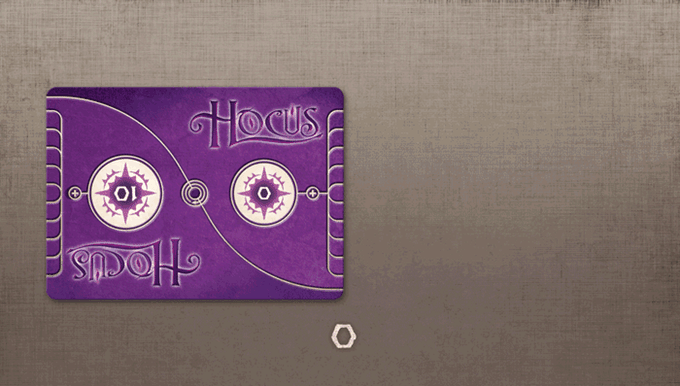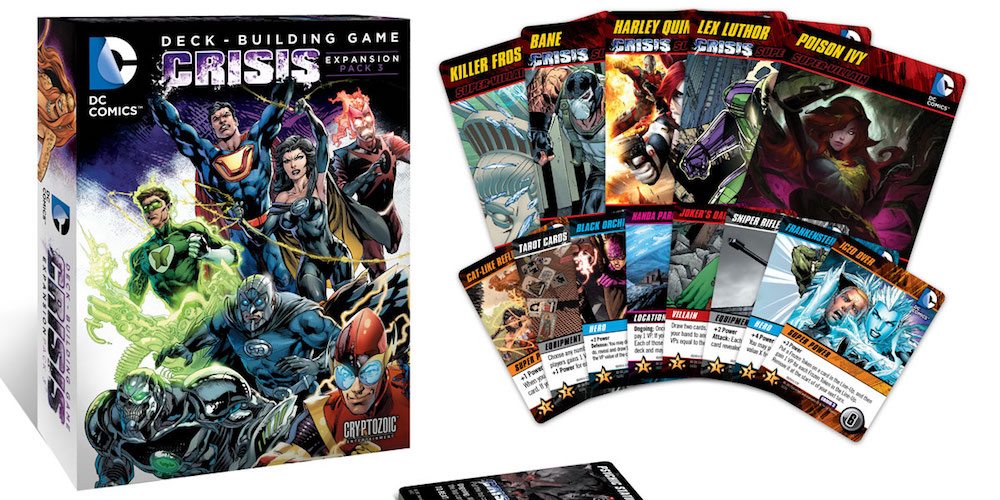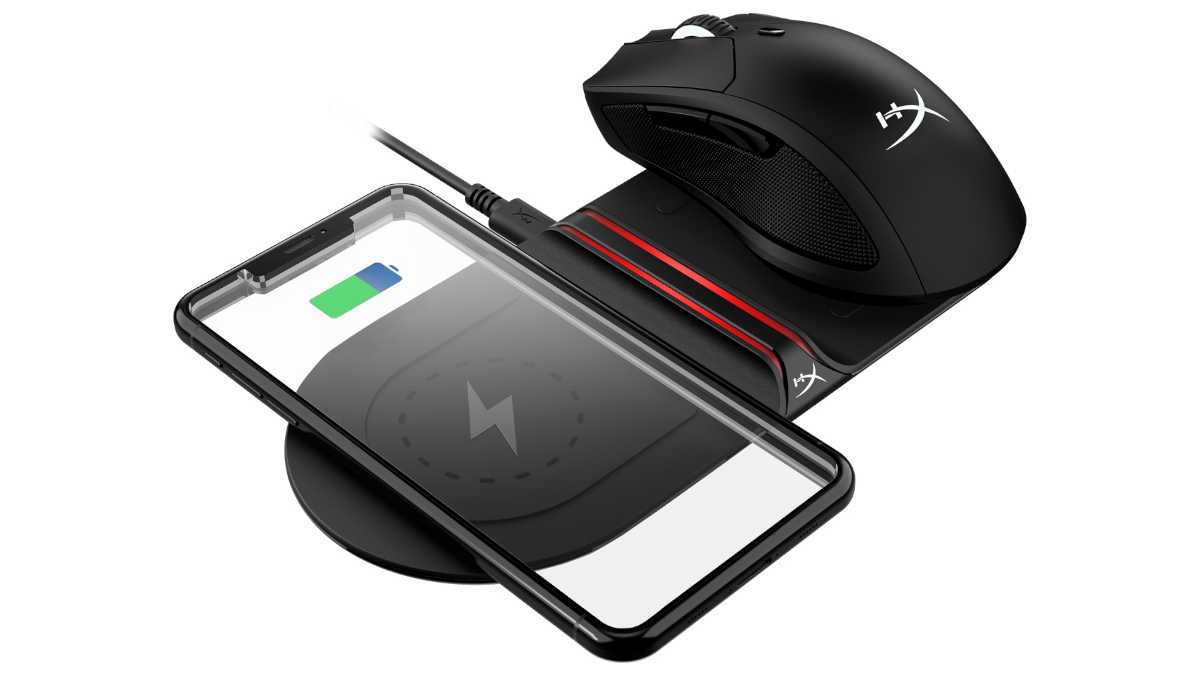Hocus is like poker for wizards: you’re still going for the best 5-card hand, but there are multiple communities, multiple pots to win, and some crazy spells flying around.
At a glance: Hocus is for 2 to 5 players, ages 14 and up, and takes about 30 minutes to play. It’s currently on Kickstarter, with a pledge level of $15 for the game. (Shipping is free in the US.) The game doesn’t have anything inappropriate for younger kids, but because of the strategy involved, I would probably not go too much younger than the recommendation except with kids who are more experienced gamers–some experience with poker may help but isn’t necessary.
New to Kickstarter? Read our crowdfunding primer.

Components:
- 60 playing cards (15 each in 4 suits)
- 24 unique Spell cards (3 each in 8 types)
- 5 Reference cards
- 10 Score Tracking cards

The playing cards have beautiful illustrations on them, and each card has a number, suit, and point value in the top left corner. The Owl suit also includes a special ability, printed at the bottom of the card. It did bother me a little that the cards do not include the number and suit on the opposite corner, so you have to turn all the cards face up when you get your hand. Many games have cards that have a single orientation, but because this game is poker-like, I think it feels a little stranger.
The spell cards come in 8 different types, and are made to look like pages of a book. The Score Tracking cards come in a pair–one keeps track of the 10s digit, and the other has a series of markings for the 1s, so you can go up to 39 points. I first came across something like this for Strife, and I’m glad to see it use here, too–it’s such an easy way to keep track of points without a lot of extra components, though you do have to watch that you don’t bump the cards. (The prototype copy I played with did not have the score cards, so we just used Penny Gems instead.)
How to play
You can download a copy of the rules here, and there’s also a free print-and-play available if you’d like to try the game out for yourself.
The goal of the game is to reach 25 points first by forming poker hands and winning pots.
Each player gets a reference card (showing the 3 Basic Spells) and score tracker cards. If you’re playing the full version of the game, each player also gets a set of 3 Advanced Spells of the same type–these are placed face-up in front of the player.
Depending on the number of players, you may need to remove some of the cards from the playing cards deck. Then you shuffle the playing cards, and deal 10 to each player (or 9 in a 5-player game).
The game is played in a series of rounds. On your turn, you get to use one spell, Basic or Advanced (and optionally one Owl, but we’ll get to that). The Basic Spells let you add cards to a Community, a Pot, or a Pocket. Advanced Spells are a bit crazier, and let you draw cards or manipulate other cards on the table.
There are 2 or 3 Communities on the table depending on the number of players, and each can contain up to 4 cards, usually face-up. Next to each Community is a Pot, which has cards played face-down; there can be any number of cards in each Pot. Each player may have up to 2 Pockets, with up to 2 cards each, usually face-down.
The round continues until all of the Communities are full, and then each player gets one more turn. Or, if all players run out of cards, the round ends. Then, you resolve the showdowns.

The first player picks the order in which to resolve the Communities. Each player may commit a Pocket to the current showdown, and then everyone reveals their pockets. The best 5-card hand (made up of the Pocket and Community) wins the showdown–these are traditional poker hands, like Full House and Flush and Two Pairs. You reveal the cards in the Pot, and the player earns the total number of point values shown on those cards. Also, if there were any Owl cards in the Pot, the player gets to keep those face-up to be used in the next round.
Each Pocket may only be used in one showdown, and once all the Communities have been resolved, all cards are shuffled and a new round begins.
One difference from traditional poker is resolving ties. If two players have the same type of hand, the player with the higher cards in that hand wins the tie, but you only consider cards that form part of the hand. For example, if two players are tied with a pair each, you don’t look at any of the cards other than the pair itself. If it’s still a tie, then the players split the pot as evenly as possible, and nobody claims the Owl cards.
Owls have special abilities, like drawing extra cards, peeking at all the cards in a Pot, or preventing other players from adding to a Community until your next turn. On each of your turns, you may use one Owl card for its ability in addition to your one spell per turn. Owls that aren’t used by the end of the round are discarded and shuffled back in.
If any player has 25 points or more at the end of a round, the player with the highest score wins.
For “Classic Hocus Poker,” you play with only the Basic Spells and ignore Owls.

The Verdict
I don’t play a lot of poker and I’m generally not very good at it, but I like the idea of it. That may explain why I like variations on poker, like David Sirlin’s Pandante. Hocus, designed by Grant Rodiek and Joshua Buergel, is another fun twist on poker and I’ve really been enjoying it.
It does take a round or two before you start to figure out the strategy, though. Although it uses the same hand types as poker, the way that the cards are played is quite different, and it’s not immediately intuitive. Instead of having the Communities and Pockets be randomly dealt from a common deck, they are assembled by the players themselves. It gives you more agency but also introduces more decisions to make. Rather than trying to predict what cards your opponents may have and what card might show up next in the Community, you have to decide when it’s appropriate to add a card to a Community, and which ones to keep in your Pocket.
Of course, all of this is moot if there are no cards in the Pots. You could get a Straight Flush and beat everyone, but if nobody had added any cards to that Pot, then your winning hand is worthless. Also, if you’re the only player with a Pocket in any given showdown, then you could win the hand with just a single high card, not even a pair.
Because your actions each turn are limited, you never have total control over what’s in a Community–you could put one card in, and by the time your next turn rolls around, it’s full, and your plan for a flush could be totally ruined. When we first started learning the game, we often ran into the situation where the Communities were filled up, triggering the end of the round, but many players hadn’t put any cards into their Pockets yet.

I played several games of “Classic Hocus,” without the Advanced Spells, and it’s a lot of fun even though I’ve still been learning the strategy. I did get a chance to play a couple of rounds with the Advanced Spells, too, and they introduce a good bit of chaos, which is also a lot of fun. For instance, the Illusion spellbook has Mirage, which lets the player put a card into a Community face-down, making it hard for other players to know whether they’ve got a winning hand or not. Some of the spells let you peek at cards in a Pot, and sometimes even move them to Communities or Pockets.
What I like about the Advanced Spells is that it makes the game asymmetric–each player gets a different set of three spells, so then you try to figure out how to use your particular combination of spells most effectively.
All in all, Hocus packs a lot of game and replay value in a $15 package. Hyperbole Games decided not to do any stretch goals in this campaign, opting instead to start with everything at their highest desired quality: nice cardstock, 5-player capability, extra spellbooks, and so on. You can also get additional copies of the game for $13, so if you’ve got friends who are interested you can pledge together. I’ll be interested to see how that pays off for the campaign, since they won’t have the usual route of building up excitement around stretch goal announcements.
I recommend Hocus for people who like poker with a twist, and the Advanced Spells are great for players who love to mess up other players’ plans. It’s a great price point for another compact game that goes up to 5 players.
For more information, visit the Hocus Kickstarter page.
Disclosure: I received a prototype copy for review purposes.






